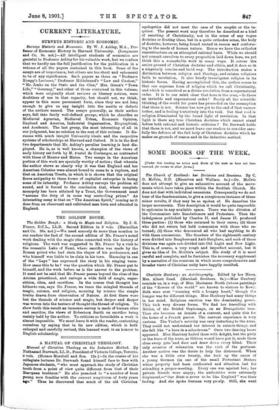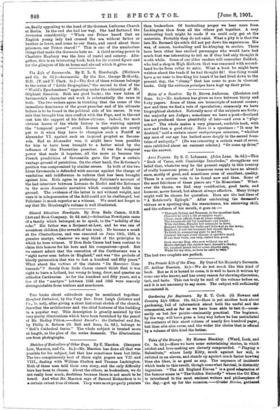Charlotte Hanbury : an Autobiography. Edited by her Niece, Mrs.
Albert Read. (Marshall Brothers. 6s.)—Miss Hanbury reminds us, in a way, of Miss Marianne North (whose paintings of the "flowers of the world" are known to visitors to Kew). Both were ever "roaming with a hungry heart," though the hunger was for different things. Miss Hanbury had many things in her mind. Religious emotion was the dominating power. This took very diverse forms. We find her travelling with Muller, of the Bristol Orphanage, on an Evangelistic tour. Then she becomes an inmate of a convent, and quits this for the house of a French pastor. The convent experience is very curious. The Visitor's activity was very disturbing to the nuns. They could not understand her interest in outside things, and she felt like "a hare in a schoolroom." Once two dancing boars appeared. Miss Hanbury hailed them with delight, but the piety or the fears of the nuns, as Gibbon would have put it, made them close every gate and door and draw down every blind. Their only occasion of relaxation was the visit of the postman. Another motive was the desire to help the distressed. When she was a little over twenty, she took up the cause of a young German (in one of the small Protestant States; whose property had been confiscated and situation lost for attending a prayer-meeting. Every one was against her ; her private friends were angry; the authorities were extremely displeased,—" Our State is never to be like England" was their feeling. And she spoke German very po.:,rly. Still, she went
on, finally appealing to the head of the German Lutheran Church at Berlin. In the end she bad her way. She had fluttered the dovecotes considerably. "When our Prince heard that an English young lady had crossed the sea without father or brother or lover, and come to our State, and cared about these prisoners, our Prince stared !" This is one of the numberless things that make the Germans hate us. A third moving power in Charlotte Hanbury was the love of travel and scenery. Alto- gether, this is an interesting book, both for its central figure and for the glimpses of life at home and abroad which it gives us.







































 Previous page
Previous page